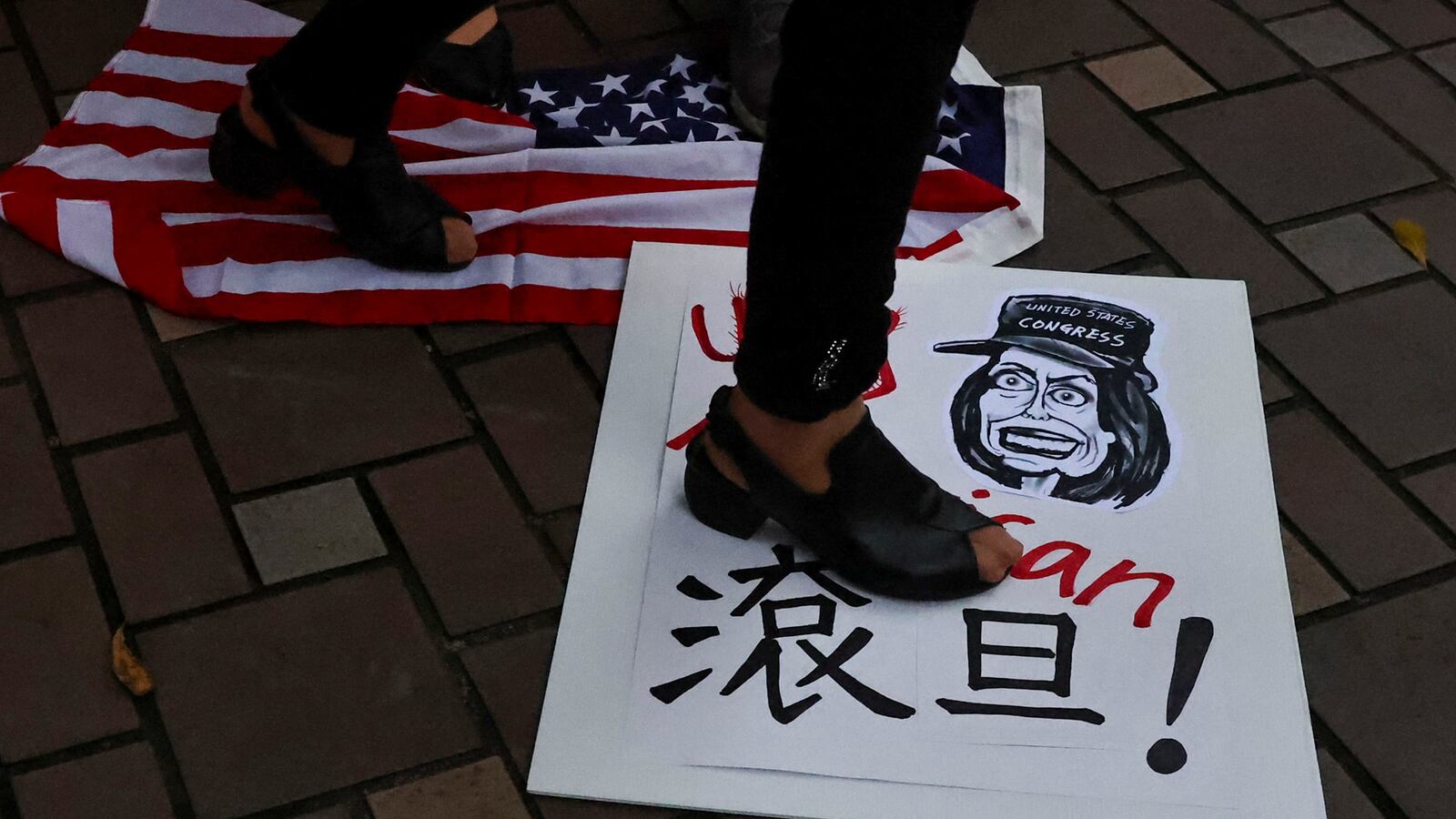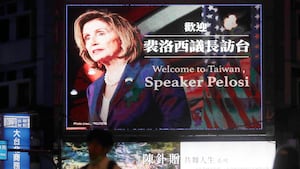Speaker Nancy Pelosi (D-CA) and her entourage including five other members of Congress arrived in Taiwan’s capital of Taipei in a blaze of lights and symbolism Tuesday night after a five-hour flight from Malaysia and promptly went to their hotel for a little rest.
If her arrival seemed like a triumph of defiance against threats from the mainland capital of Beijing, there was far from universal applause among the locals despite her claim that the visit was “part of our unwavering commitment” to Taiwan.
Nor was everyone convinced the visit shows “America’s solidarity with the 23 million people on Taiwan more closely than ever,” as she said in her arrival statement. After all, The Daily Beast reports that the White House tried to talk her out of the trip.
Indeed, if Pelosi may count on Chinese-American support in her San Francisco congressional district, she would definitely have trouble mustering votes in Taiwan.
Her stay will only be brief— one night, then a full day of meetings with top Taiwan leaders and politicos before she flies to her next stop, South Korea. “We’re going to make sure she has a safe and secure visit,” John Kirby, national security council coordinator for strategic communications, told CNN shortly after her arrival. “There is no reason for this to escalate tensions.”
That having been said, the aircraft carrier Ronald Reagan—carrying fighter planes—was on its way to the Taiwan Straits at the very same time along with destroyers and supply vessels. Taiwan was “strengthening combat readiness,” according to Taiwan’s Central News Agency.
Indeed, in a bow to security, Pelosi never said before taking off for Singapore last weekend that she would go to Taiwan, and no one was told when she left Malaysia that Taipei was her destination There was no doubt, however, where she was going, especially since her hotel had a great welcome sign up there in lights.
Pelosi, in her arrival statement, and Kirby were at pains to convince the Chinese that her visit in no way contradicted America’s one-China policy, as enunciated in 1979 after President Jimmy Carter transferred recognition to Beijing.
“The United States stands with the people of Taiwan,” Pelosi declared, and Kiby argued there was nothing “at all inconsistent: about loving Taiwan while making nice with Beijing. Please, Kirby begged, there’s “no reason for China to overreact.”
Those claims, though, were not likely to appease China or assuage hurt feelings, much less convince everyone in Taiwan that her visit would only bring good tidings as Beijing just can’t stop issuing nasty statements.
With Pelosi now firmly on the disputed Chinese territory, the ball is in China’s court to fire back. There was no doubt her visit would be filled with nothing but upbeat statements and expressions of friendship, but all the happy talk isn’t likely to convince a lot of people on Taiwan that her presence is an unmixed blessing.
Amid all the excitement, Pelosi’s stop-off in the island state is eliciting more jeers than cheers, more protests than praise, and, what really hurts for any vote-happy politician, more shrugs than interest.
That’s the view as the world waits to see what Beijing will do to make good on its threats of “consequences” as Pelosi and her entourage arrived under cover of darkness for what looked like an enormously over-hyped few hours on the island state. She didn’t seem likely to go beyond cliches about Taiwan’s heroic role as a stalwart defender of democracy against big, bad, bullying China, but that was hardly the point.
Just by setting foot on Taiwan, the first elected American official to dare visit the island since another House Speaker, Newt Gingrich, dropped by in 1997, Pelosi was making her own point. Never mind that the Taiwanese would be the first in China’s line of fire if the Chinese actually decided to make good on their claim that Taiwan is really part of China.
Nor did it seem to matter that Gingrich was, and is, a staunch Republican and Pelosi a hard-hitting Democrat. Like Newt, Nancy seemed to think she was promoting democratic values and American interests by leading her delegation into such an exemplar of a “free world.” A lot of folks, however, begged to differ.
As she was arriving, one young Taiwanese, Yang Chien-Hao, told The Daily Beast, “The biggest sacrifice she can make for Taiwan is if she skips the visit.”
Outside Taiwan, “people are saying that she is causing trouble” while many of the island’s 23.5 million people “do not care much about it,” said Yang. They were inclined to shrug it off while obsessed with “domestic issues that are much bigger and attracting more attention than Pelosi’s visit.”
Still, it was hard for people to get away from the frenzy surrounding the visit after all the advance publicity, and China came in for its share of the blame by making such a fuss about it.
“If a visit causes that big a risk,” said Yang, “then the problem is on China, not her.” China, he said, “should listen and understand Taiwan more before trying to unify us”—that is, by threatening to drag Taiwan under Beijing’s control as Chinese leaders have been vowing to do ever since the victory of Mao’s Red Army on the mainland in 1949.
If Pelosi was not expected to go beyond the usual platitudes when she meets top Taiwan leaders, including President Tsai Ing-wen, on Wednesday, legislators were polite. Lo Chih-cheng of the ruling political party was quoted by Taiwan’s Central News Agency as calling her visit “a touchstone for the Taiwan-U.S. alliance.” Legislator Wang Ting-yu said her visit would show the alliance could “withstand pressure from China,” which he called “a troublemaker.”
In fact, in keeping with the “one China” policy of recognizing only Beijing as the capital of all China, including the province of Taiwan, the U.S. and Taiwan are not bound by any alliance. The U.S. has only a “mission” on the island instead of an embassy in Taipei, no American military people are stationed on Taiwan, and U.S. and Taiwan forces do not join in military exercises.
Nonetheless, their remarks underlined the bond that Taiwan leaders would like to maintain with the U.S. in the face of threats from Beijing. After all, didn’t President Biden affirm his “commitment” to Taiwan’s defense when visiting Tokyo and Seoul in May—and doesn’t Taiwan import hundreds of millions of dollars worth of American arms every year?
As Pelosi’s plane touched down on the island, everyone was waiting with bated breath to see what on earth China’s President Xi Jinping had in mind when he warned President Biden in a phone conversation against “playing with fire.”
Taiwan officialdom was polite but otherwise not talking about the Pelosi drop-by. “The ministry has remained low-key on Pelosi's visit to Taiwan,” was the most that diplomatic spokesman Jimmy Lin would tell The Daily Beast. There was, he said, “no additional information or comment on the reports that she will arrive Tuesday night.”
Beijing had a lot more to say, most of it threatening but carefully non-specific. Possible scenarios included firing missiles at sea, sending planes over Taiwan, not just into the air defense identification zone, blockading ports—just about anything short of actually going to war for Taiwan, which is not really expected.
Then again, there was also the possibility Beijing wouldn’t do a damn thing right away beyond coming out with flowery rhetoric. Beijing could also punish Taiwan by cutting off exports of crucial products, and it could punish the U.S. too by playing games with trade and investment.
On the streets of Taipei, the prevailing response was, what else is new? “We’ve been hearing that for years,” one Taiwanese told The Daily Beast. “We’re used to it.”







